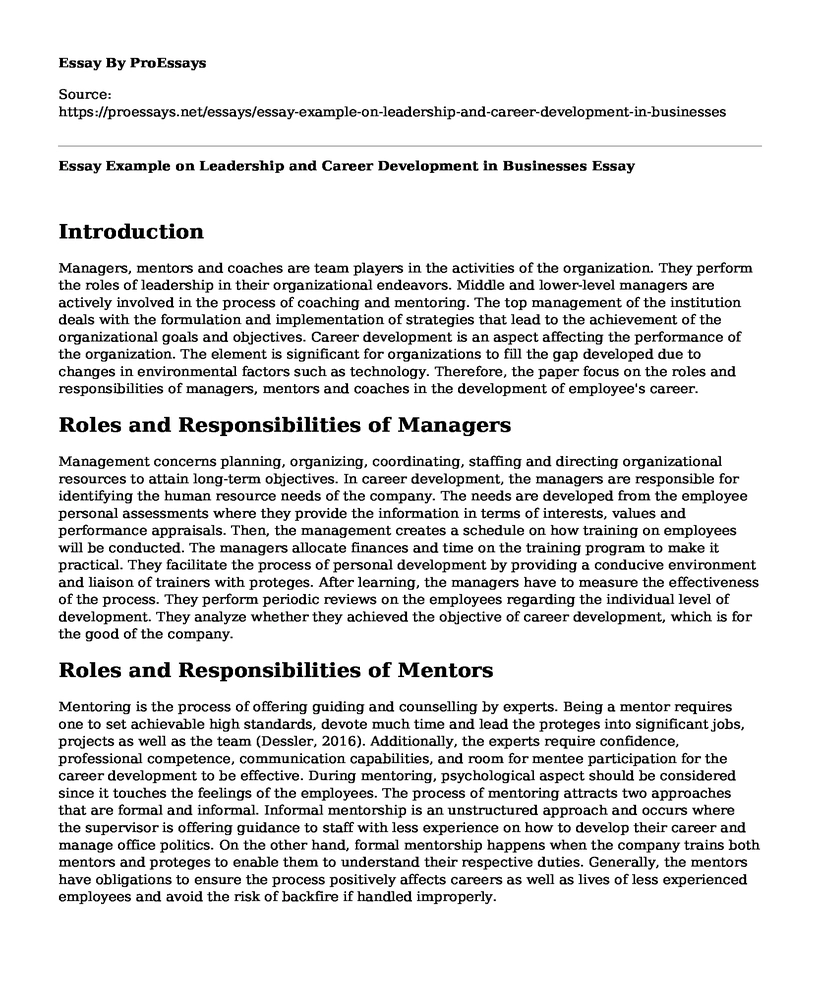Introduction
Managers, mentors and coaches are team players in the activities of the organization. They perform the roles of leadership in their organizational endeavors. Middle and lower-level managers are actively involved in the process of coaching and mentoring. The top management of the institution deals with the formulation and implementation of strategies that lead to the achievement of the organizational goals and objectives. Career development is an aspect affecting the performance of the organization. The element is significant for organizations to fill the gap developed due to changes in environmental factors such as technology. Therefore, the paper focus on the roles and responsibilities of managers, mentors and coaches in the development of employee's career.
Roles and Responsibilities of Managers
Management concerns planning, organizing, coordinating, staffing and directing organizational resources to attain long-term objectives. In career development, the managers are responsible for identifying the human resource needs of the company. The needs are developed from the employee personal assessments where they provide the information in terms of interests, values and performance appraisals. Then, the management creates a schedule on how training on employees will be conducted. The managers allocate finances and time on the training program to make it practical. They facilitate the process of personal development by providing a conducive environment and liaison of trainers with proteges. After learning, the managers have to measure the effectiveness of the process. They perform periodic reviews on the employees regarding the individual level of development. They analyze whether they achieved the objective of career development, which is for the good of the company.
Roles and Responsibilities of Mentors
Mentoring is the process of offering guiding and counselling by experts. Being a mentor requires one to set achievable high standards, devote much time and lead the proteges into significant jobs, projects as well as the team (Dessler, 2016). Additionally, the experts require confidence, professional competence, communication capabilities, and room for mentee participation for the career development to be effective. During mentoring, psychological aspect should be considered since it touches the feelings of the employees. The process of mentoring attracts two approaches that are formal and informal. Informal mentorship is an unstructured approach and occurs where the supervisor is offering guidance to staff with less experience on how to develop their career and manage office politics. On the other hand, formal mentorship happens when the company trains both mentors and proteges to enable them to understand their respective duties. Generally, the mentors have obligations to ensure the process positively affects careers as well as lives of less experienced employees and avoid the risk of backfire if handled improperly.
Roles and Responsibilities of Coaches
Coaching process focuses on activities of the organization, which is easily relearned. The coaches involve proteges in strategies and methods of operation that are certified in career development (Napolitano, 2015). They identify in the approaches the weaknesses and give recommendations from their perspective. However, the coaches do not provide the results or outcome. They hold the employees accountable for the actions that result from the process of coaching. Coaches enable the institution to discover and develop the talents of the employee in the rather than significantly contributing to the performance of the firm.
Conclusion
In conclusion, the managers, coaches and mentors experience the same role and responsibilities in the career development of the employees. The groups perform a leadership role through directing a team towards the attainment of the objective. The managers who are much skilled and have enough experience act as mentors to offer guidance to new employees of the company. The same occurs to coaching when the manager gives an opinion towards the daily operations of the company. Therefore, coaching and mentoring cannot be distinct from management roles and responsibilities in the employee's career development process.
References
Dessler, G. (2016). Human resource management (15th Ed.). New York: Pearson.
Napolitano, A. (2015, December 3). Manager, coach or mentor? Different roles for different. Business.com. https://www.business.com/articles/manager-coach-or-mentor-different-roles-for-different-goals/
Cite this page
Essay Example on Leadership and Career Development in Businesses. (2023, Jun 06). Retrieved from https://proessays.net/essays/essay-example-on-leadership-and-career-development-in-businesses
If you are the original author of this essay and no longer wish to have it published on the ProEssays website, please click below to request its removal:
- Intelligence Community Organization and Careers Essay
- Management Discussion and Analysis Paper Example
- Essay on Organizations Need to Adjust: Business Ops Mgmt for Long-Term Success
- Essay Example on Understanding Leadership: Defining Capacity to Stimulate Change
- 8-Step Ethical Decision-Making: Gather Facts, Analyze & Solve Challenges - Essay Sample
- Motivation Enhancing Staff Performance: Examining the Impact at Walmart Inc. - Paper Example
- Create Home Wireless Network: Fast Connectivity, Automatic Home Features - Paper Example







